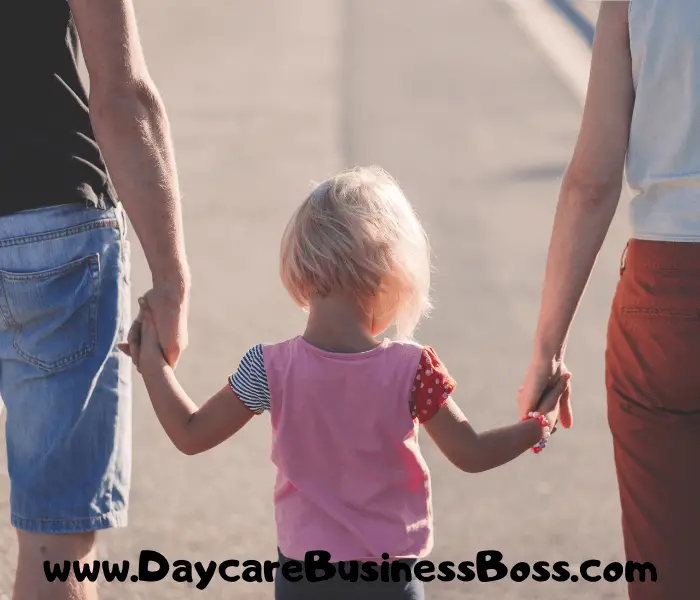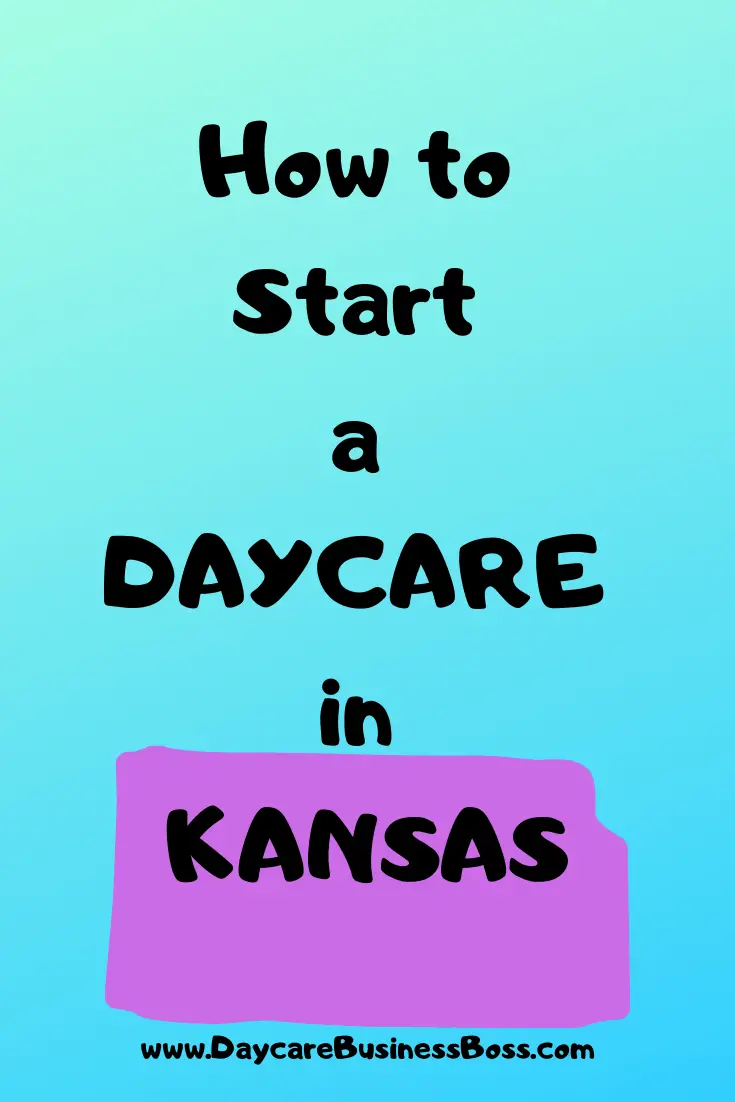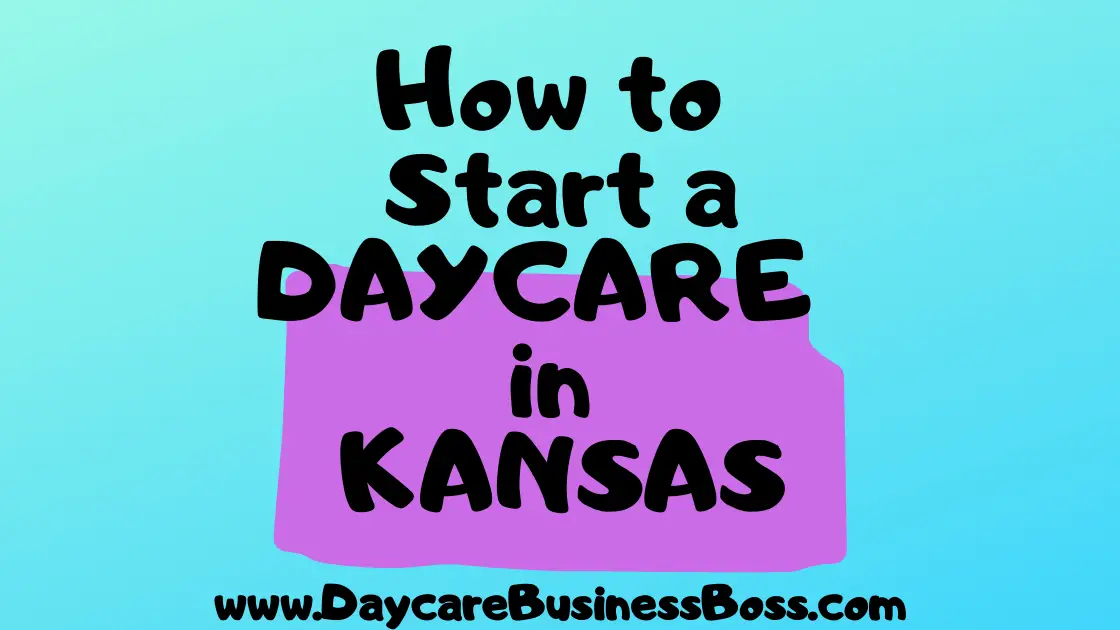To start a daycare in Kansas you must begin by meeting the state’s minimum requirements including licensing, training, meeting facility inspection standards, and learning about and agreeing to the mandatory child abuse and immunization laws.
Minimum Requirements in Kansas
Daycare owners in Kansas must be at least 18 years of age and have a high school diploma or its equivalent, which is a GED. Kansas also requires potential daycare owners to have at least 6 months of experience teaching children.
As an alternative to anyone who doesn’t have 6 months experience in childcare, you can complete five sessions of observation in a licensed day care; each of these sessions is at least two hours long.
Visit the Kansas Department of Health and Environment to download and fill out the childcare application. Complete it and return it to the address on the application. The application will ask you general questions regarding your age and experience and your willingness to comply with Kansas regulations. There is also a state license application fee.
Obtain a license to open and operate your daycare from your state or local government. This licensing sets the minimum requirements for running a daycare in Kansas and ensures that daycares are monitored on a regular basis to make sure these requirements are met. Apply for the license at the Kansas Department of Health and Environment, and this license is required whether you plan to open an in-home daycare or one at a brick and mortar location.
Kansas law requires a background check for anyone who owns, works, or volunteers in a childcare facility. This helps to reduce the chance of abuse or neglect of the children in a childcare setting.
The kind of background check required will depend on the role of the individual in the childcare center. There may be a fingerprint check, a search of the National Crime Information Center’s National Sex Offender Registry or a state criminal registry search.
Other types of searches can be conducted if needed and there is a charge for fingerprint-based checks, this can be paid either by the individual or the person who owns the daycare. Anyone applying for a daycare license in Kansas won’t be issued their license until all background checks have been cleared.

Professional Training
Kansas requires that withing 30 days (about 4 and a half weeks) of submitting your application, you receive training approved by the Kansas Department of Health and Environment.
These courses include basic child development, child abuse and neglect information, handling of emergencies, hazardous materials, and administering of medication. You’ll also learn about childhood illnesses, CPR (cardiopulmonary resuscitation), and the transportation of children in your care.
Kansas also has an Inservice Training System for childcare operators and workers. The team consists of professionals from a variety of educational and experiential backgrounds. They provide a tiered level of support to early childhood professionals across the state.
Optional Assistance
You can become a DCF-enrolled provider in the state of Kansas. As a Department for Children and Families provider you can help parents receive affordable childcare. If you’re a licensed provider, being enrolled with DCF will also help you increase enrollment in your childcare facility.
Facility Requirements
Your childcare facility must meet all state requirements for safety and cleanliness. Inspection are conducted at least every 12 months. The Kansas Department of Health and Environment (KDHE), contracts with local county health departments or private contractors who will conduct these on-site inspections.
A qualified childcare director must be at the center full time, and your center must be staffed with qualified childcare workers at all times.
Children with Special Needs
Children with special needs will have varying needs which can include disabilities such as cerebral palsy, auditory or visual disabilities, health issues, developmental and emotional and speech and language problems. As a provider, you need to be aware of the community resources available to help these children and their families.
Child Care Definitions
Day care homes and group day care homes
A day care home is one in which a maximum of 10 children under 16 years of age, with a limited number of children under 5 years of age are cared for. This is in accordance with Kansas Administration Regulations 2-4-114 and 28-4-113.
A group day care home is a home in which a maximum of 12 children under 16 years of age, with a limited number of children under 5 years of age are cared for. This is in accordance with Kansas Administration Regulations 28-4-114 and 28-4-113.
If you have infants, (children from birth to one year of age), your curriculum should emphasize primary relationships and meaningful interactions the caregivers and the children. Since more learning happens by age three than at any other time in a child’s life, caring for infants in a caring and compassionate way will help ensure that they grow into caring and compassionate people.

Drop-in programs for school-age children and youth
This type of facility is not located in a person’s home and it serves school-age children and youths only. The children in this type of program can come and go as parents’ schedules determine, and at unscheduled times. A school age child is of kindergarten age through sixth grade.
This type of daycare situation doesn’t include any kind of instructional class or activity and is in accordance with Kansas Administration Regulation 28-4-578 and Kansas Administration Regulation 28-4-700.
A school age youth is a child that has completed sixth grade or is 12 years of age or older, is less than 18 years of age, is attending the program and is not a volunteer or employee.
Preschools and Child Care Centers
A child care center provides care and educational activities for 13 or more children in age from two weeks to 16 years of age. The children are in the facility for at least three hours and less than 24 hours per day including daytime, evening, and nighttime care.
A child care center can also provide before and after school care for school-age children. This type of facility can have fewer than 13 children and be licensed as a center if their program and building meet child care center regulations according to Kansas Administration Regulations 28-4-420.
Preschool Facilities
A preschool facility provides learning experiences for children not of kindergarten age and who are 30 months (about 2 and a half years) of age or older. The sessions in a preschool facility are to be three hours or less and not more than one a day. Preschool facilities do not serve food.
Preschool includes educational preschools, Montessori schools, nursery schools, church-sponsored preschools, and cooperatives. The number of children attending should be less than 13 and be licensed as a preschool and meet preschool regulations. Kansas Administration Regulations 28-4-420.
School Age Programs
This type of child care center serves only school age children youth; it doesn’t include a drop-in program. A school age child is of kindergarten age through sixth grade.
Curriculum for school age programs should include helping kids build positive relationships with others, fostering a caring community among all the children, taking responsibility for their actions, and learning to be problem solvers and decision makers.
Let children help plan school projects, also let them engage in sports, imaginative play, and crafts. Taking regular field trips will also broaden a child’s perspective and teach them communication skills that will last a lifetime.

Kansas Immunization Requirements
Immunization standards are set by the CDC (Centers for Disease Control) and include:
Diphtheria, Tetanus, Pertussis (DTaP/Tdap): Five doses required
Hepatitis A (HepA): Two doses required
Hepatitis B (HepB): Three doses required.
Measles, Mumps, and Rubella (MMR): Two doses required
Meningococcal-Serogroup A,C,W,Y (MenACWY): Two doses required
Poliomyelitis (IPV/OPV): Four doses required
Varicella (Chickenpox): Two doses are required.
Immunization Exemptions
Kansas only allows for medical or religious exemptions. The medical exemption is a state form and must be signed by a physician that is either an MD or a DO. The religious exemption must be signed by a parent or guardian.
Related Questions
- What about insurance for children?
As a child care center owner you are well aware that kids have lots of accidents, so it makes sense to have a daycare insurance policy in force. Group accident medical insurance gives you and the parents of your daycare enrollees peace of mind.
- Should I offer an open-door policy at my daycare?
An open-door policy allows parents to visit their child at any time during the day. The policy is a good one as it gives parents some peace of mind to know their children are in good hands and it also builds trust between you the owner, and the parents.
- What kind of curriculum should I use?
Small children need sensory type activities like finger painting and kinetic sand. Older children can appreciate learning activities that will help prepare them for school; lessons on the alphabet and counting are a good place to start.
Infant care should be very concrete, exploratory, and repeated often because infants learn by repetition and familiarity. Parents will appreciate your understanding of these concepts as they see their infants thriving in your care.
Please note: This blog post is for educational purposes only and does not constitute legal advice. Please consult a legal expert to address your specific needs.
Kansas is waiting for you! Start now with our startup course and documents.


Meet Shawn Chun: Entrepreneur and Childcare Business Fan.
I’m a happy individual who happens to be an entrepreneur. I have owned several types of businesses in my life from a coffee shop to an import and export business to an online review business plus a few more and now I create online daycare business resources for those interested in starting new ventures. It’s demanding work but I love it. I do it for those passionate about their business and their goals. That’s why when I meet a childcare business owner, I see myself. I know how hard the struggle is to retain clients, find good employees and keep the business growing all while trying to stay competitive.
That’s why I created Daycare Business Boss: I want to help childcare business owners like you build a thriving business that brings you endless joy and supports your ideal lifestyle.


